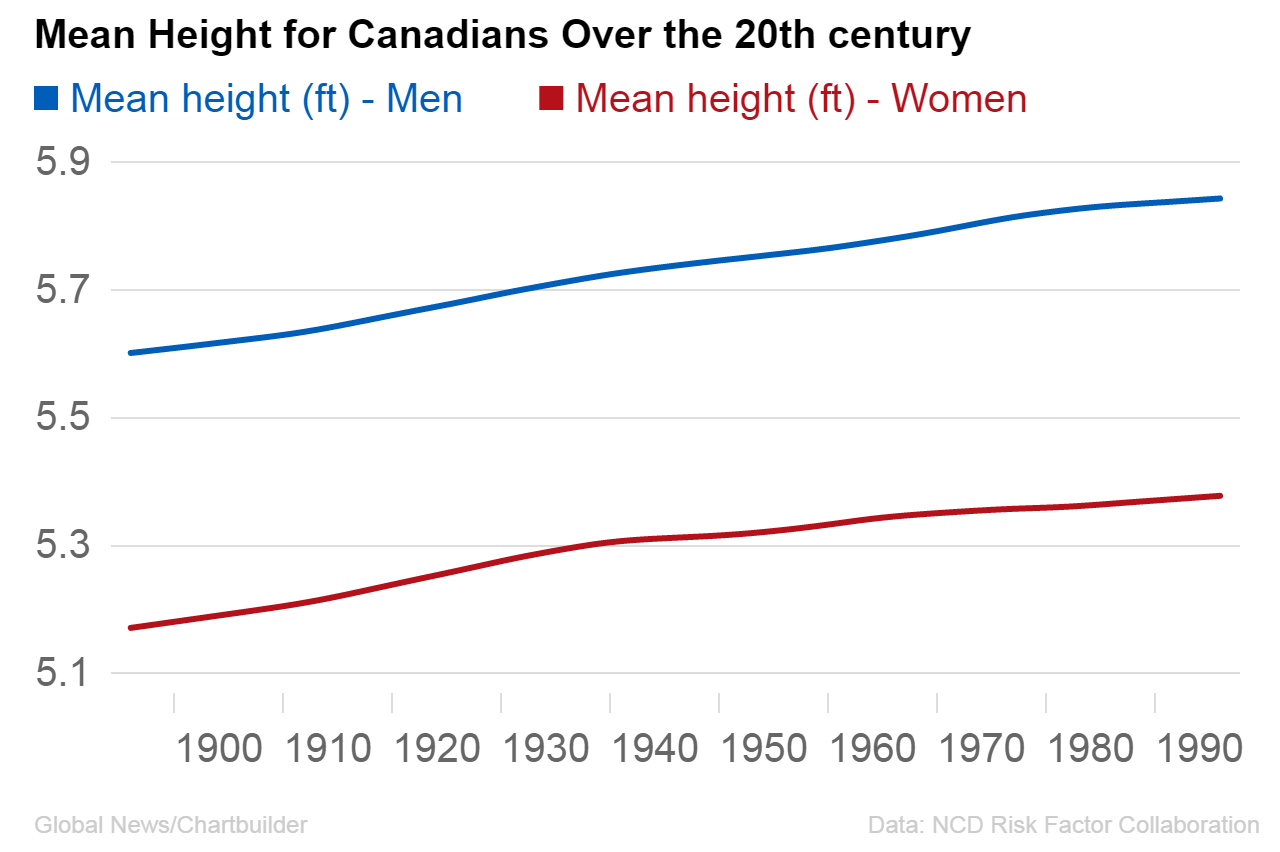Canadians have grown taller, but they’re not measuring up as high as they once did compared to other countries.

When it comes to males, Canada slipped from having the world’s fifth tallest men (5’6″ on average) in 1914 to 27th (with a height of 5’8″) a century later.
That’s the finding from a global survey, published in the journal eLife. They looked at the size of more than 18.6 million people in 200 countries who, between 1914 and 2014, turned 18 (that’s usually the age people stop growing).
Over that stretch, Canadian women fell from sixth tallest to 40th.

So where do the tallest people live? The top honours go to Europe.
Dutch men (at 6 feet) and Latvian women (5’7″) tower above all the rest. If you’re into tall people, here’s where else you can find them:
Top 10 countries with the tallest men (in 2014)
- The Netherlands
- Belgium
- Estonia
- Latvia
- Denmark
- Bosnia-Herzegovina
- Croatia
- Serbia
- Iceland
- Czech Republic
Top 10 countries with the tallest women (in 2014)
- Latvia
- The Netherlands
- Estonia
- Czech Republic
- Serbia
- Slovakia
- Denmark
- Lithuania
- Belarus
- Ukraine
- What is B.C.’s Mental Health Act and why is it relevant to Tumbler Ridge shooting?
- YouTube, Roblox say they deleted accounts tied to Tumbler Ridge shooter
- Elections Canada says Freeland broke rule by answering byelection questions
- Air Canada says it saw strong profits despite drop in U.S. travel demand
READ MORE: At 6’8″, Brian Pallister is now Canada’s tallest premier
The shortest men (5’3″) can be found in the Southeast Asian nation of East Timor. The smallest women live in Guatemala. They had a four-inch growth spurt over the past 100 years, but still fall one inch short of five feet.

Get breaking National news
The largest jump in height appeared in South Korean women and Iranian men, who added 8 inches over the century-long span of the study.
In some Sub-Saharan countries (such as Rwanda, Sierra Leone and Uganda), the average height has actually shrunk.
Size matters
“People from different countries grow to different heights. This may be partly due to genetics, but most differences in height between countries have other causes,” the study explained, citing sanitation and nutrition as potential factors.
“For example, children and adolescents who are malnourished, or who suffer from serious diseases, will generally be shorter as adults.”
Height in the U.S. has remained stagnant for about 20 years. The country lags behind dozens of others in height, which maxed out at 5’10” for men in 1996 and 5’5″ for women in 1988.
The researchers didn’t investigate why exactly that is. But John Komlos, a North Carolina professor who’s studied height, has a few theories:
- lack of health insurance
- shortfalls in medical and prenatal care
- underweight and preterm babies from teenage pregnancies
- and a rise in obesity, which leads to earlier puberty and so stoppage of growth
Canadians growing wider
In terms of where Canada sits on the obesity scale, we have the 23rd most obese men in the world (up from 34th in 1975) and we’re 59th when it comes to prevalence of female obesity (up from 84th in 1975).
The study puts the average body mass index of Canadian 18-year-old women in 2014 at 26.7. Canadian men’s average BMI comes in a touch higher, at 27.4. Those are considered to be in the “overweight” range.
Both men and women were in the “normal” range in 1975.
Other researchers, however, cautioned this year against using BMI to measure health, saying “the data shows there are tens of millions of people who are overweight and obese and are perfectly healthy.”
READ MORE: Want to lose weight? Here’s why the numbers on your scale don’t matter
Those behind the research hope their findings can help improve conditions around the globe.
The height advantage
The study points out “taller people generally live longer, are less likely to suffer from heart disease and stroke, and taller women and their children are less likely to have complications during and after birth.”
Other research has also shown that taller people may also see greater success at school and make more money.
READ MORE: Obese women in Canada make less money than non-obese women: study
On the downside, they’re also apparently more likely to develop some cancers.
You can see more on how Canadians have changed in size and stature here.
With files from The Associated Press







Comments
Want to discuss? Please read our Commenting Policy first.